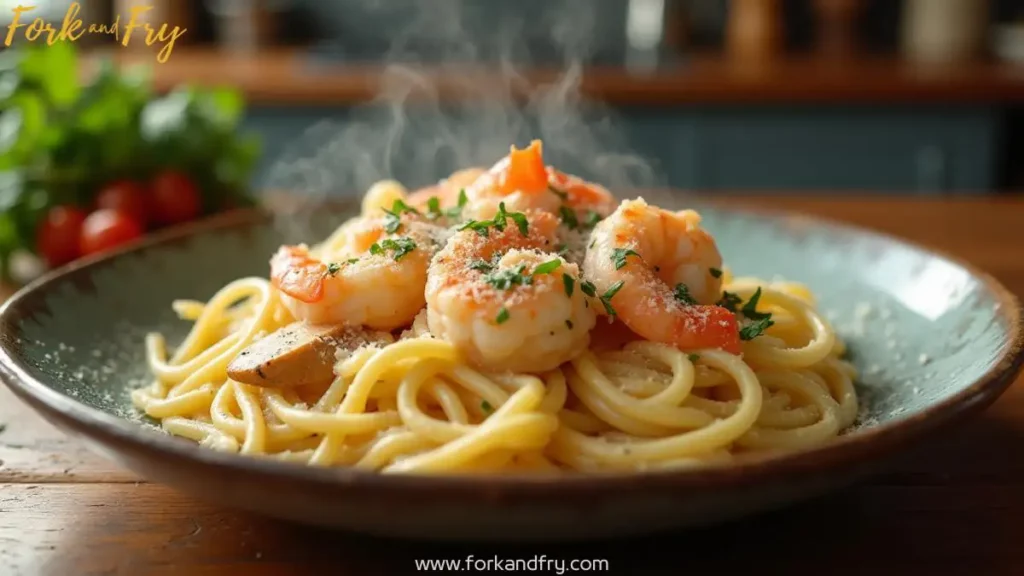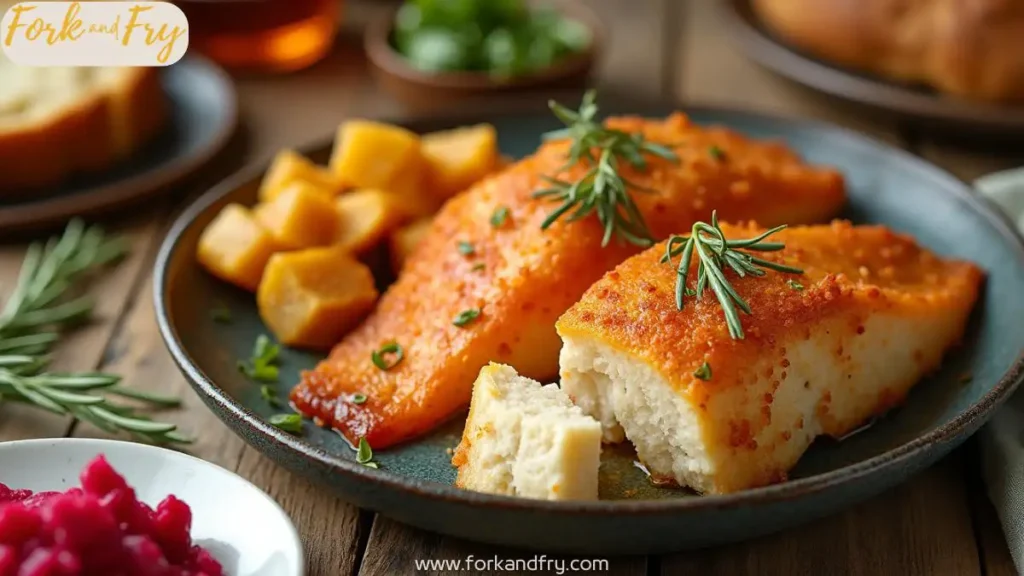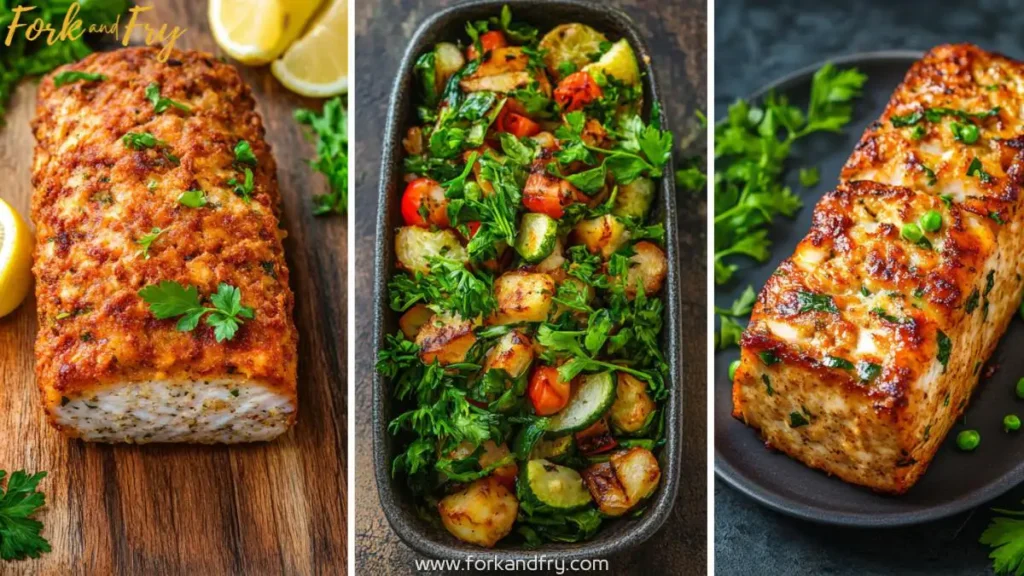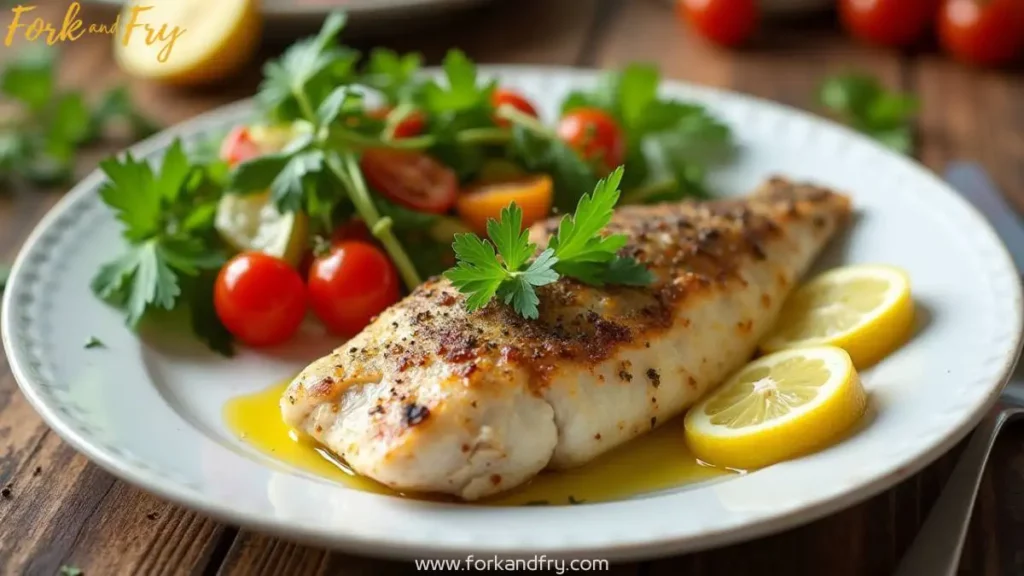Last updated on November 9th, 2024 at 05:57 pm
Table of Contents
Jewish Gefilte Fish is a beloved dish for Jewish kitchen, especially at holidays like Passover and Rosh Hashanah. It’s made from fresh fish turned into delicate fish quenelles. This dish brings history and culture to your table with every bite.
Whether you’re new to cooking or have experience, making gefilte fish is a rewarding task. It’s a way to celebrate Jewish holidays with true authenticity and flavor. Plus, different Jewish communities have their own gefilte fish recipes, but this classic one is a favorite everywhere.
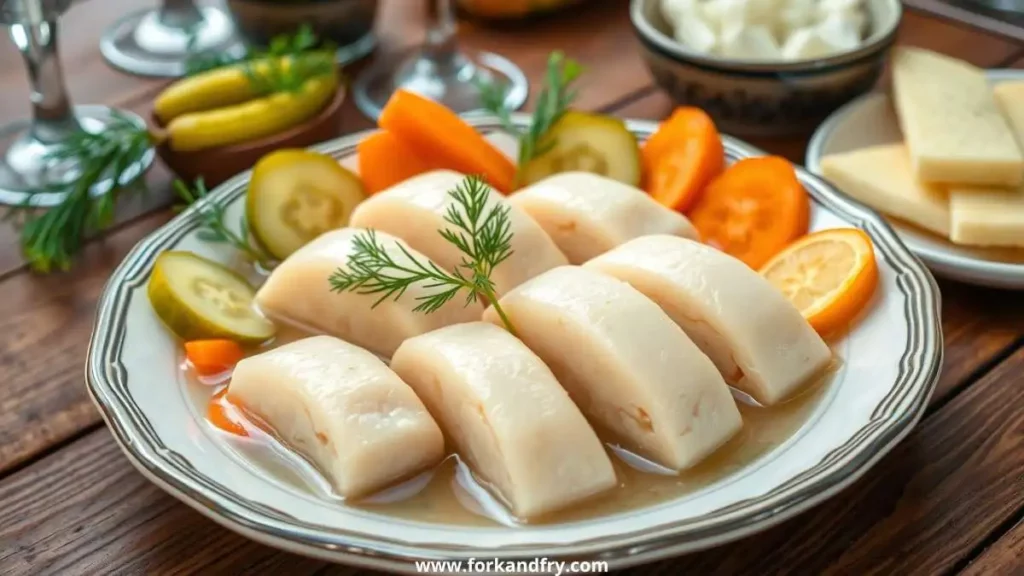
Key Takeaways
- Learns the process of making traditional gefilte fish.
- Discover its significance in Jewish holiday meals.
- Get a step-by-step guide suitable for all skill levels.
- Explore different variations of the recipe.
- Enhance your holiday table with authentic flavors.
Introduction to Jewish Gefilte Fish
Gefilte fish is a key part of Jewish cuisine with a long history. It comes from Eastern Europe and is loved during Sabbath and festive meals. This dish is a big part of Jewish food traditions.
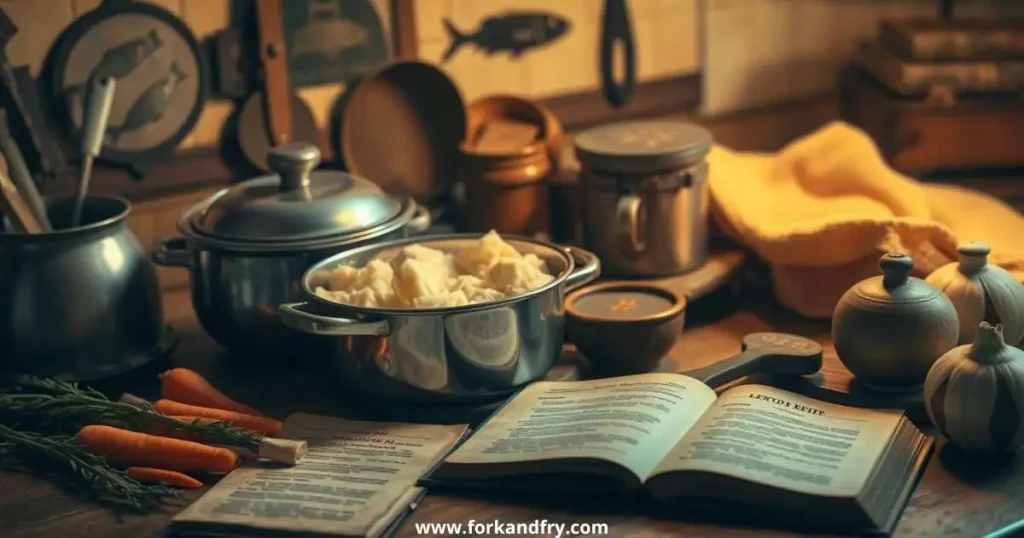
This dish was made to stretch food and follow Jewish dietary laws. It’s made from fish like carp, whitefish, and pike. Over time, it has changed to fit the tastes of Jewish people everywhere.
Gefilte fish is more than just food. It shows Jewish strength and cleverness. In many families, it’s a special dish that links past and present, keeping Ashkenazi food traditions alive.
Gefilte fish has come a long way from its simple start. Knowing its history helps us see its value in Jewish cuisine. It’s not just food; it’s a symbol of a rich heritage.
| Aspect | Details |
|---|---|
| Origin | Eastern Europe |
| Main Ingredients | Carp, Whitefish, Pike |
| Cultural Significance | Symbol of Resilience and Tradition |
| Occasions | Sabbath, Festive Meals |
Ingredients Needed for Classic Jewish Gefilte Fish
To make a classic Jewish gefilte fish, you need fresh ingredients, the right spices, and optional extras. This guide will help you pick the best ingredients for a dish that’s both authentic and tasty.
Fresh Ingredients
The heart of your gefilte fish is the fish itself. You’ll want to use fresh carp, whitefish, and pike. It’s important to get these fish fresh for the best taste and texture. Buying from a trusted fishmonger or kosher market will improve your dish’s quality. Here’s a table to help you understand each fish:
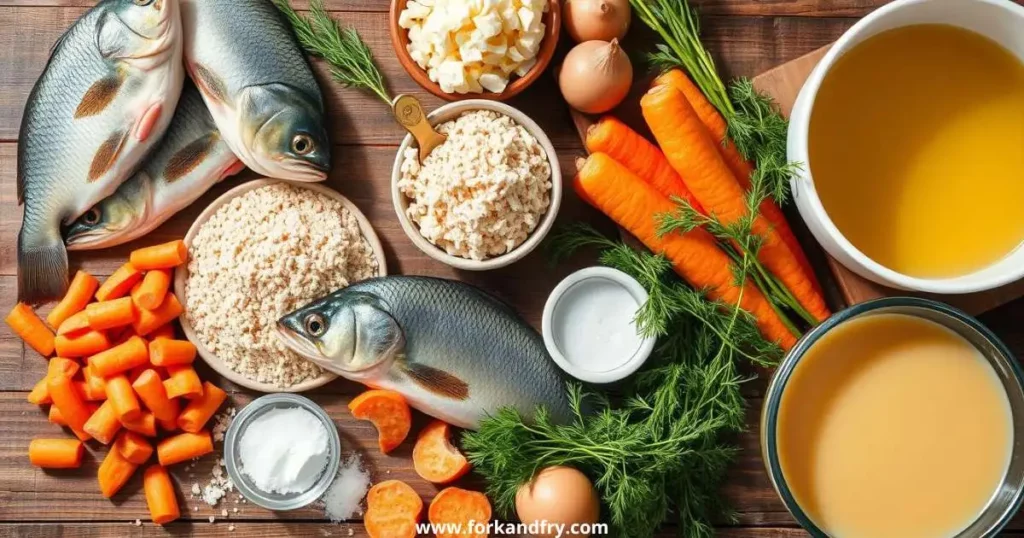
| Fish Type | Flavor | Texture | Notes |
|---|---|---|---|
| Fresh Carp | Rich | Firm | Commonly used in Jewish cuisine |
| Whitefish | Mild | Flaky | Offers a balance of flavor |
| Pike | Subtle | Dense | Provides a unique texture |
Spices and Seasonings
Spices and seasonings are key to gefilte fish’s classic taste. You’ll need finely chopped onions, kosher salt, and black pepper. Matzo meal helps bind the mix, improving texture and taste. The right mix of these ingredients makes the dish flavorful without being too strong.
Optional Additions
While the basic recipe is great, you can add your own touches. A bit of sugar can add sweetness, which some like. Enhance the flavor with fresh herbs like dill or parsley. These extras let you make the dish your own while still following kosher traditions.
Preparing the Fish
The first step in gefilte fish preparation is choosing the right fish. A mix of freshwater fish like carp, whitefish, and pike is best. Begin by rinsing the fish under cold water to remove any scales.
Once cleaned, move on to fish filleting techniques. Use a fillet knife to take off the skin and bones. Make sure only the flesh remains. This is key to avoid bones ruining the dish’s texture.
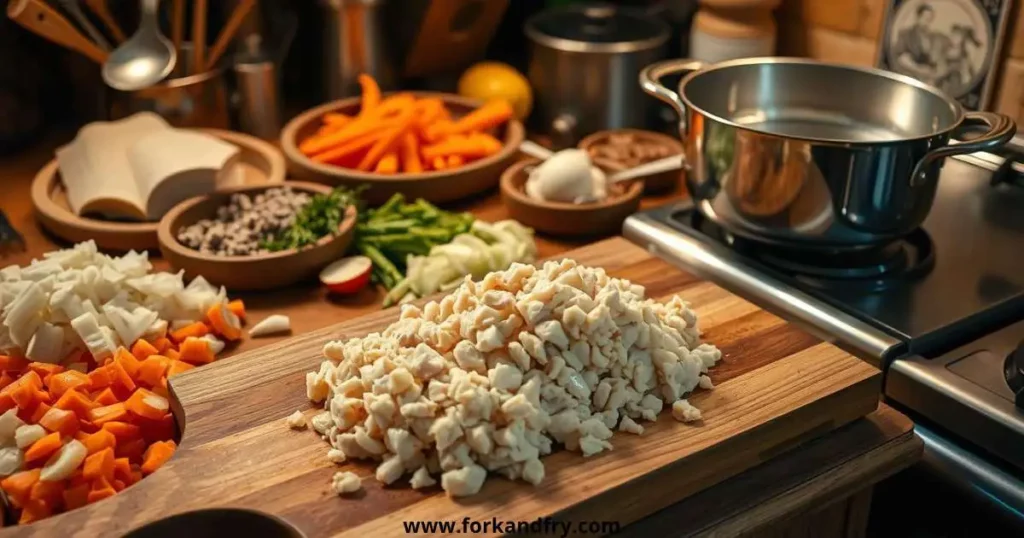
After filleting, grind or chop the fish as part of Jewish culinary practices. Use a meat grinder or food processor for a smooth consistency.or chop it by hand if you prefer a coarser texture.
Reserving the fish broth is crucial. Set aside the bones and heads to make a rich stock. This stock boosts the dish’s flavor. Mix the ground fish with onions, carrots, and matzo meal. Season with salt, pepper, and a touch of sugar to balance the flavors.
The fish mixture’s consistency is key for shaping quenelles. The fish mixture should be firm yet not overly dense. Test a small portion by forming a ball and dropping it into boiling water. If it holds its shape, it’s ready to cook.
Cooking Methods for Jewish Gefilte Fish
Explore different ways to cook Jewish gefilte fish. Choose from traditional or modern methods to make a dish that suits your taste.
Boiling Method
The classic way to boil gefilte fish is to simmer it in a tasty broth. Start by making a stock with fish parts, carrots, onions, and spices. Shape the fish mix into balls or loaves and add them to the hot liquid. Cook for 1 to 1.5 hours until it’s firm and cooked through.
This method makes the gefilte fish moist and tender. It’s a favorite in Jewish cooking today.
Baking Method
For a firmer texture, try baking it. Put the fish patties in a dish, maybe on parchment paper. Add a seasoned broth to keep it moist. Cover with foil and bake at 350°F for one hour.
- Preheat oven to 350°F.
- Arrange gefilte fish in a single layer in a baking dish.
- Pour seasoned vegetable broth over the gefilte fish.
- Cover with foil and bake for 1 hour.
This method makes a denser gefilte fish. It’s great for those who prefer a heartier taste.
Alternative Cooking Techniques
New methods offer exciting ways to cook gefilte fish. Use a slow cooker for an easy cooking process. Just put the fish patties and your favorite broth in the slow cooker. Cook on low for 6-8 hours. It’s perfect for when you’re busy.
Steaming is another modern way to cook gefilte fish. Place the patties in a steamer basket over boiling water. Cover and steam for about 45 minutes. It’s a light and healthy option.
| Cooking Method | Key Characteristics | Best For |
|---|---|---|
| Boiling | Moist, tender, absorbs broth flavors | Traditionalists |
| Baking | Firmer, textured, uses vegetable broth | Firmer bite preference |
| Slow Cooker | Convenient, flavorful, hands-free | Busy schedules |
| Steaming | Light, healthy, preserves moisture | Health-conscious |
Serving Suggestions for Classic Jewish Gefilte Fish
Gefilte fish is a beloved dish in Jewish holidays. Serving it with care can make your meal special. Here are some ideas for serving it traditionally and with a modern twist, along with tips for a beautiful presentation.
Traditional Accompaniments
Traditionally, gefilte fish comes with horseradish sauce and carrots. Serve with white or beet horseradish for an extra zesty kick.Carrots, sliced into rounds, sit on top, symbolizing life and prosperity. These sides not only taste great but also hold deep Jewish heritage.
Modern Twists
For a modern take, try new gefilte fish serving ideas. Serve it on a bed of mixed greens or with a light vinaigrette. You can also make gefilte fish sliders with mini brioche buns and horseradish sauce. These ideas make the dish appealing to all ages.
Presentation Tips
Presenting your dish well is key. Use fresh herbs like dill or parsley for color and freshness. Arrange the gefilte fish on a beautiful platter and add lemon wedges for brightness. Thoughtful presentation can turn this traditional dish into a stunning centerpiece.
Conclusion
Our journey through making classic Jewish gefilte fish has shown us the detailed techniques and the rich heritage it carries. Making homemade gefilte fish is more than cooking; it’s a way to celebrate Jewish heritage. It’s a tradition that brings people together at the dinner table.
Choosing the freshest ingredients and mastering cooking methods are key. Every detail adds to the dish’s authenticity and flavor. You’ve learned that balancing spices and trying new twists while keeping traditional flavors is important. Serving it with classic sides or modern touches, the dish’s heart stays the same.
Embrace this chance to connect with your heritage, share joy with loved ones, and enjoy the delicious results. This experience can inspire you to try more Jewish dishes, making new memories and honoring your heritage. Your culinary journey in Jewish dishes has just started, with many flavors and stories to discover.
FAQ
What fish types are used in a traditional gefilte fish recipe?
Traditional gefilte fish recipes often use carp, whitefish, and pike. These fish give the dish its unique texture and flavor, typical of Jewish cooking.
What is the cultural significance of gefilte fish in Jewish cuisine?
Gefilte fish is very important in Jewish cuisine, especially for Ashkenazi Jews. It’s served on the Sabbath and during holidays like Passover and Rosh Hashanah. It’s practical and holds deep symbolic meaning in Jewish culinary traditions.
What spices and seasonings are essential for making gefilte fish?
Key spices for gefilte fish include onion, salt, pepper, and matzo meal. These give the dish its distinctive taste and texture. You can also add sugar for sweetness and herbs for extra flavor.
How do you prepare the fish for gefilte fish?
First, clean and fillet the fish, removing bones and skin. Then, grind or chop the fish flesh finely. Save the fish broth for cooking the fish quenelles.
What are the main cooking methods for gefilte fish?
Traditionally, gefilte fish is boiled in a flavorful liquid. You can also bake it for a firmer texture. Modern options include slow cooking or steaming, catering to different tastes and cooking styles.
What are some traditional accompaniments for serving gefilte fish?
Traditionally, gefilte fish is served with horseradish, beet horseradish, and cooked carrots. These add flavor and balance, making the dish a highlight of Jewish holidays and festive meals.
Can gefilte fish be incorporated into modern dishes?
Yes, gefilte fish can be updated for modern tastes and cooking. It can be an appetizer, part of salads, or paired with new side dishes for a fresh take on the classic.
How should you plate and present gefilte fish?
For a beautiful presentation, garnish gefilte fish with fresh herbs, lemon slices, or colorful veggies. Serving it on a bed of greens or with vibrant sauces can also make it visually appealing, fitting both traditional and modern dining.
